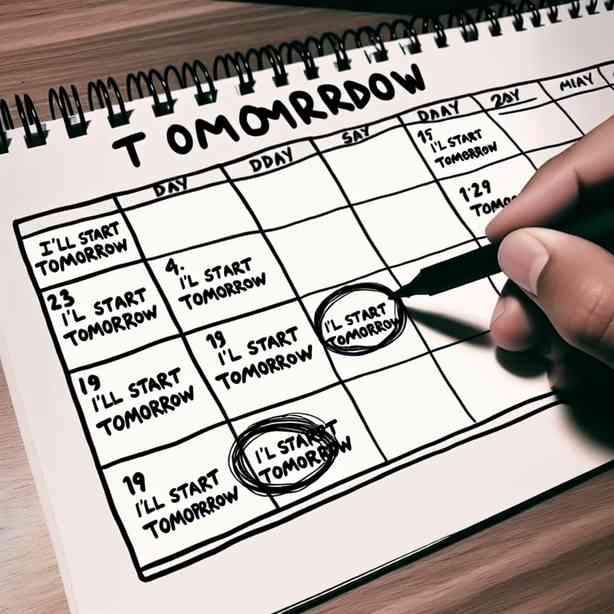
Procrastination often manifests in our everyday lives, particularly when it comes to setting goals and making changes. The phrase “I’ll start tomorrow” is one that many of us have uttered in various contexts, whether we are attempting to adopt a healthier lifestyle, begin a new project, or even tackle daily responsibilities. However, the problem arises when this seemingly innocent postponement transforms into a more extended delay, pushing our plans to next week, next month, or even further into the future. Understanding why we procrastinate in this manner is essential for overcoming it and fostering a more productive mindset.
To begin with, let’s explore some psychological factors contributing to this tendency. Many individuals grapple with the fear of failure. When we set goals, especially those that are significant or life-altering, there’s an inherent pressure to succeed. This pressure can lead to anxiety, causing us to delay taking the first step. The thought of potentially disappointing ourselves or others can be paralyzing. We may convince ourselves that starting tomorrow will allow us to prepare better, giving us the time to gather resources, research, or simply feel more mentally ready. However, this waiting game often becomes a barrier, trapping us in a cycle of avoidance that prevents us from moving forward toward our goals.
Another aspect to consider is the concept of instant gratification. In a world where everything is available at our fingertips, it’s easy to get distracted by short-term pleasures. This tendency frequently leads us to prioritize activities that provide immediate satisfaction over those requiring sustained effort, such as exercise or learning a new skill. This distraction can make the idea of starting tomorrow feel appealing because we can indulge in instant gratification today, promising ourselves to tackle our responsibilities later. However, this cycle of indulgence and procrastination often leads to feelings of guilt or regret as we neglect our commitments.
Furthermore, the issue of perfectionism plays a significant role in our procrastination. Many people hold themselves to high standards, often leading them to feel that their work needs to be flawless before they can even begin. This mindset can create a paralyzing fear of imperfection, making them hesitant to embark on their endeavors. As a result, the mantra of “I’ll start tomorrow” serves as a comforting excuse to delay beginning until conditions seem right. Unfortunately, this can spiral into a habit of never beginning at all, stunting personal growth and achievement.
Now that we understand some psychological barriers to starting, let’s delve into practical strategies to combat procrastination effectively. One powerful approach is setting specific, achievable goals. Instead of saying, “I will get in shape,” consider a more manageable goal, such as “I will walk for 30 minutes every day.” By breaking down larger goals into smaller, concrete tasks, you can create a clearer path toward success. This smaller commitment seems less daunting and can reduce the pressure you may feel to be perfect. Achieving these mini-goals builds momentum and confidence, paving the way for tackling larger challenges.
Another effective strategy is implementing a structured schedule. Allocating specific time slots for tasks can help you prioritize and stay on track. Utilize planners or digital tools to carve out time for your objectives and make them a non-negotiable part of your routine. By treating your goals with the same importance as other appointments or commitments, you’ll foster a sense of accountability that can deter procrastination. This practice not only clarifies when you will work on your goals but also signals to your mind that these undertakings are essential parts of your day.
Furthermore, practicing self-compassion is crucial when combating procrastination. Recognizing that everyone struggles with time management and the fear of failure can help ease the anxiety associated with starting new ventures. Instead of chastising yourself for delays, approach your goals with kindness. Understand that setbacks and moments of pause are part of the journey, and allowing yourself to experience these without judgment can create a healthier mindset. This shift toward self-compassion encourages you to approach your tasks with a sense of curiosity rather than fear, making it easier to begin.
Lastly, it is essential to identify and eliminate distractions that enable procrastination. Evaluate your environment and assess what keeps you from focusing on tasks at hand. This could be digital distractions, like social media, or even the clutter in your workspace. By creating a conducive environment for productivity, you enhance your ability to concentrate on the goals you’ve set. Consider implementing techniques like the Pomodoro Technique, where you work in short, intense bursts followed by brief breaks. This method helps maintain focus while allowing your mind to rest periodically, improving overall efficiency.
As we wrap up this exploration into the dynamics of procrastination, it’s crucial to recognize that the phrase “I’ll start tomorrow” is a familiar refrain for many. However, understanding the psychological and practical aspects behind this delay can facilitate a powerful transformation in how we approach our goals. By acknowledging the barriers that lead us to procrastinate and implementing effective strategies, we can shift from a mindset of avoidance to one of action.
Starting today, remember that progress is often made in small steps, and it’s never too late to initiate change. Embrace the journey toward achieving your objectives with patience and determination. When you find yourself saying, “I’ll start tomorrow,” take a moment to reflect on the reasons behind it and consider whether today might be the better choice. After all, every day presents a new opportunity to take action, let today be the day you begin transforming “I’ll start tomorrow” into “I’m starting now.”


